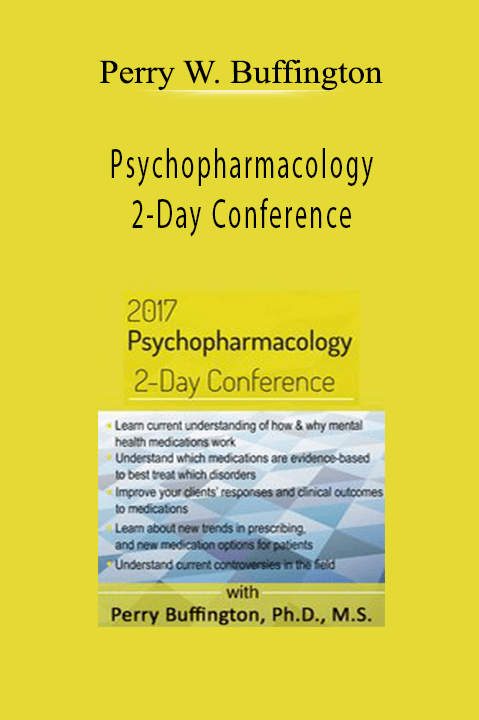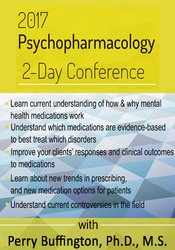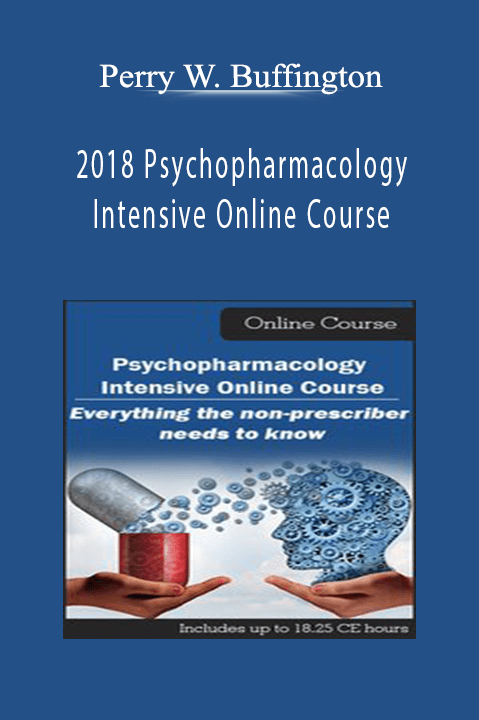Psychopharmacology 2-Day Conference – Perry W. Buffington
- Learn current understanding of how & why mental health medications work
- Understand which medications are evidenced-based to best treat which disorders
- Improve your clients’ responses and clinical outcomes to medications
- Help your clients recognize side effects and learn how to manage them
- Learn about new trends in prescribing
- Understand current controversies in the field
- New and emerging ethical dilemmas both prescribing and non-prescribing clinicians face daily
Spend two action-packed days learning about the newest advances in psychopharmacology and contemporary trends in medication management. From his unique perspective, Dr. Perry Buffington teaches psychopharmacology thoughtfully, with an emphasis on the experience of the client. Dr. Buffington’s years of experience in mental health and passion for clients, shines through in the detail and thoroughness of his presentation.
Clients often only have a few minutes with their prescriber and require additional support. It’s vital that you are able to answer their questions, help manage side effects and understand reactions. Designed for counselors, nurses, psychotherapists, psychologists, and other mental health professionals, Dr. Buffington provides the information you need in order to best help your clients.
This conference allows time for exploration of underrepresented areas, including ADHD, substance use disorders and psychopharmacological ethics. Take home specialized guidelines for geriatrics, and clients with chronic pain. Discuss how the DSM-5® and the Affordable Healthcare Law have impacted prescribing patterns and the use of psychotropics in newly defined diagnoses. In addition to a general ‘nuts and bolts’ review of medications, you will examine case examples, discuss medication controversies and how to effectively collaborate with prescribing practitioners. You will find this conference to have the most up- to-date medication information and how to use it most effectively with your client.
Satisfaction Guarantee
Your satisfaction is our goal and our guarantee. Concerns should be addressed to: PO Box 1000, Eau Claire, WI 54702-1000 or call 1-800-844-8260.
ADA Needs
We would be happy to accommodate your ADA needs; please call our Customer Service Department for more information at 1-800-844-8260.
- Analyze the historical antecedents of psychopharmacological products and their relation to today’s psychotropic medications.
- Designate the mechanism of action of today’;s psychotropic medications and how it relates to your clients.
- Breakdown the process of medication selection and receptor activation/blocking for specific disorders.
- Communicate the side effects including nutritional, cognitive, sexual, and behavioral associated with psychotropic medications.
- Specify how medications are chosen for mood disorders and specific patient characteristics.
- Compile medication treatment options for your clients with ADHD.
- Determine the unique medication considerations for geriatric clients.
- Determine acute and chronic pain and methods of treatment.
- Analyze future trends, including preventing side effects vs. managing side effects.
- Establish ethical issues specifically relating to the child and adolescent population as it relates to clinical psychopharmacology.
- Apply traditional standards (autonomy, beneficence, nonmaleficence, confidentiality, veracity) of ethical behavior to issues peculiar to the practice of clinical psychopharmacology.
- Explore specific ethical issues and their resolve to the everyday practice of clinical psychopharmacology.
DAY ONE
PSYCHOPHARMACOLOGY
- Historical antecedents of modern psychopharmacology
- Diagnostic issues
- Clarification of terms
- Drug metabolism concepts: pharmacokinetics & pharmacodynamics
- Drug mechanism of action
- Placebo & Nocebo
- Pharmacotherapy vs. Pharmacotherapy
- Developing highly effective collaborations with prescribers
DEPRESSIVE DISORDERS
- Biogenic Amine, Cortisol, Down-Regulation, & Neurotropic Hypotheses
- Neurochemistry of depression
- Types of anti-depressants
- Preventing side effects
- Tardive Dysphoria: real or imagined?
ANXIETY DISORDERS & OBSESSIVE COMPULSIVE DISORDERS & TRAUMA RELATED DISORDERS
- Neurochemistry of anxiety
- GAD, panic disorders, phobias
- OCD
- PTSD
- Physiological interventions
- Anti-anxiety medications
- Anti-depressants
- Non-pharmacologic options
- Benzodiazepines: risks and benefits
- Preventing side effects
BIPOLAR DISORDERS
- Neurochemistry
- The Bipolar Spectrum & DSM-5® Changes
- Mood stabilizers
- Lithium
- Anti-convulsants & neuromodulators
- Typical, atypical, & third-generation antipsychotics
- Effective strategies for improving outcomes for clients
PSYCHOTIC DISORDERS/ SCHIZOPHRENIA
- Neurochemistry of psychosis and schizophrenia
- Antipsychotic Medications:
- First generation (typical)
- Second generation (atypical)
- Managing side effects
- Extrapyramidal symptoms and TD
- Metabolic problems- what blood tests are needed and when
- Preventing Diabetes Mellitus
- Recognizing hyperprolactinemia- and why you need to know
- Use of atypical antipsychotics for multiple disorders
LIMITATIONS OF THE RESEARCH & POTENTIAL RISKS
DAY TWO
ATTENTIONAL DISORDERS
- Differential diagnosis
- Neurochemistry of ADHD
- Treatment controversies
- Substance abuse and ADHD
- Stimulant medications
- Non-stimulant options
- Preventing side effects
SUBSTANCE ABUSE DISORDERS
- Neurochemistry of addiction
- Negative reinforcement & creation of habits
- Alcohol
- Caffeine
- Nicotine
- Cannabis
- Opiates
- PCP & Ketamine
- MDMA (Ecstasy)
- Energy vs. Chill Drinks
- Over-the-counter & herbal psychopharmacology
- Addiction treatments
- Behavioral addictions
SPECIAL POPULATIONS
- Specialized guidelines for geriatric patients
- Dementia treatment
- Slow vs. rapid metabolizers (genetic polymorphisms)
TREATING CLIENTS PAIN
- Acute vs. chronic pain
- Alternatives to pharmacology
- Pain vs. depression: which comes first?
ETHICS & PSYCHOPHARMACOLOGY
- High-risk pharmacology & psychopharmacology
- Off-label use of medications
- Prescribing for children
- Elective psychopharmacology
- Marketing of mental illness
- Polypharmacy
- Informed vs. uninformed consent
- Patient & third party pressures
- Professional boundaries
- Ethics associated with medical errors
- Role of placebo
FUTURE TRENDS
- Change of mind: preventing vs. managing side effects
- Medicalization of normal
- Computer assisted devices
- New meds, new diagnoses, new theories, new normal
- Top 10 Medical Emergencies
- Integrating psychotherapy with psychopharmacology
LIMITATIONS OF THE RESEARCH & POTENTIAL RISKS
Tag: Psychopharmacology 2-Day Conference – Perry W. Buffington Review. Psychopharmacology 2-Day Conference – Perry W. Buffington download. Psychopharmacology 2-Day Conference – Perry W. Buffington discount.
Instant Access Available
Downloadable Content

Get Instant Download Psychopharmacology 2–Day Conference – Perry W. Buffington at Offimc.click Now!
Salepage: https://catalog.pesi.com/item/24536/
Archive: https://archive.fo/wip/y77z6
Delivery Information
- Upon ordering the product, a delivery email with download instructions will be sent immediately to you so that you may download your files. If you log in (or create an account) prior to purchase you will also be able to access your downloads from your account dashboard.
- It is a digital download, so please download the order items and save them to your hard drive. In case the link is broken for any reason, please contact us and we will resend the new download link to you.
- If you don't receive the download link, please don’t worry about that. We will update and notify you as soon as possible from 8:00 AM – 8:00 PM (UTC+8).
- Please Contact Us if there are any further questions or concerns you may have. We are always happy to assist!









9 reviews for Perry W. Buffington – Psychopharmacology 2–Day Conference
There are no reviews yet.